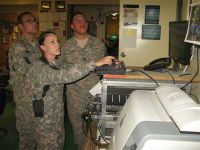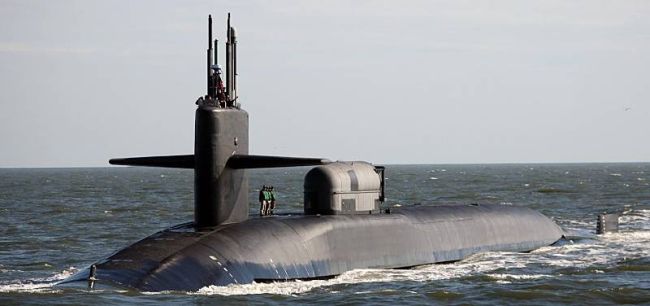BAGRAM AIRFIELD, Afghanistan, April 28, 2011 — Awareness and vigilance remain the watchwords here as news spread of yesterday’s attack at Kabul International Airport that left eight airmen and a U.S. civilian employee dead.
The attack, which occurred during an uptick of enemy activity and coalition casualties coinciding with the spring thaw, resonated with a Florida National Guard unit that supports the force-protection mission on Bagram and within the surrounding Parwan province.
“When things happen in an area of operations around here, basically the information comes down and we … look for the same patterns that happen elsewhere here as well,” said Army Spc. Xavier Flores, a 164th Air Defense Artillery soldier.
“If something happens elsewhere, it is an indication that more likely something similar could happen here or somewhere else, so you just kind of tighten down on security,” agreed Army Spc. Joseph Deramo.
Flores and Deramo are part of a joint, multitiered system that provides security at the largest coalition base in Afghanistan and intelligence support for troops operating “outside the wire.”
Their detachment runs three 107-foot towers on the base, all equipped with cameras able to scan 360 degrees in search of suspicious activity. In addition, 18 four- and five-soldier teams provide support at eight other sites within the area of operations.
Working in conjunction with aerostats and other ground-based sensors, as well as Air Force and Marine Corps security forces and the Joint Defense Operations Center, they provide persistent surveillance for troops on Bagram and beyond its perimeter.
The unit provides overwatch for convoys and patrols outside the base as well. “We save patrols all the time,” said Army Master Sgt. Wesley Erb, the detachment first sergeant, noting that tower operators have provided ground troops with their sightings of roadside bombs being planted and ambushes being staged.
One of the detachment’s proudest achievements was the discovery of a homemade explosives laboratory with 600 pounds of munitions at a village northeast of Bagram, he added. In addition, working with the 34th Infantry Division’s 2nd Brigade Combat Team of the Iowa National Guard — responsible for force protection and base support operations within Bagram and the surrounding province — the Guardsmen provided intelligence used to identify and capture a local insurgent leader.
“We are the quickest to get eyes on [developments],” Deramo said. “We keep a pretty good eye out, so if anything looks suspicious, we are going to report it up and we are going to have it checked out. If we see something suspicious, we report it to them, then we get with the Air Force as well to provide their drones accurate locations of things we have spotted.”
The unit also works with defense contractors operating radar systems that detect fast-moving objects in the airspace such as rockets or mortars, and sensors that detect motion along the base perimeter.
This speeds the response, said Army Pfc. Audrey Triplitt, “because we can give them an exact grid coordinate where they can go, so their mission can go outside the wire and locate where it is and [confirm] a possible threat.”
Trained to do air defense artillery support, the unit attended a two-week crash course at Redstone Arsenal, Ala., to receive tower certification before deploying here in November. Flores admitted that when the unit first arrived in Afghanistan and hadn’t yet learned the local patterns of life, “everything was a red flag.”
“Anybody out there almost seemed like a threat to us,” he said. Now, with five months of experience under their belt, Flores said, the team knows what to look for and is ready for what’s expected to be a busy summer.
“We are all anticipating just anything,” he said. “Our guard comes up come summer, because it gets a lot busier.”
Deramo said the team’s mission boils down to providing a watchful eye.
“By keeping 24-hour watch on the area and the surrounding population … we can allow soldiers that have to go out and do convoys a chance to actually rest and not have to worry about what is going to happen when they sleep,” he said.
Source:
U.S. Department of Defense
Office of the Assistant Secretary of Defense (Public Affairs)

 von
von 

